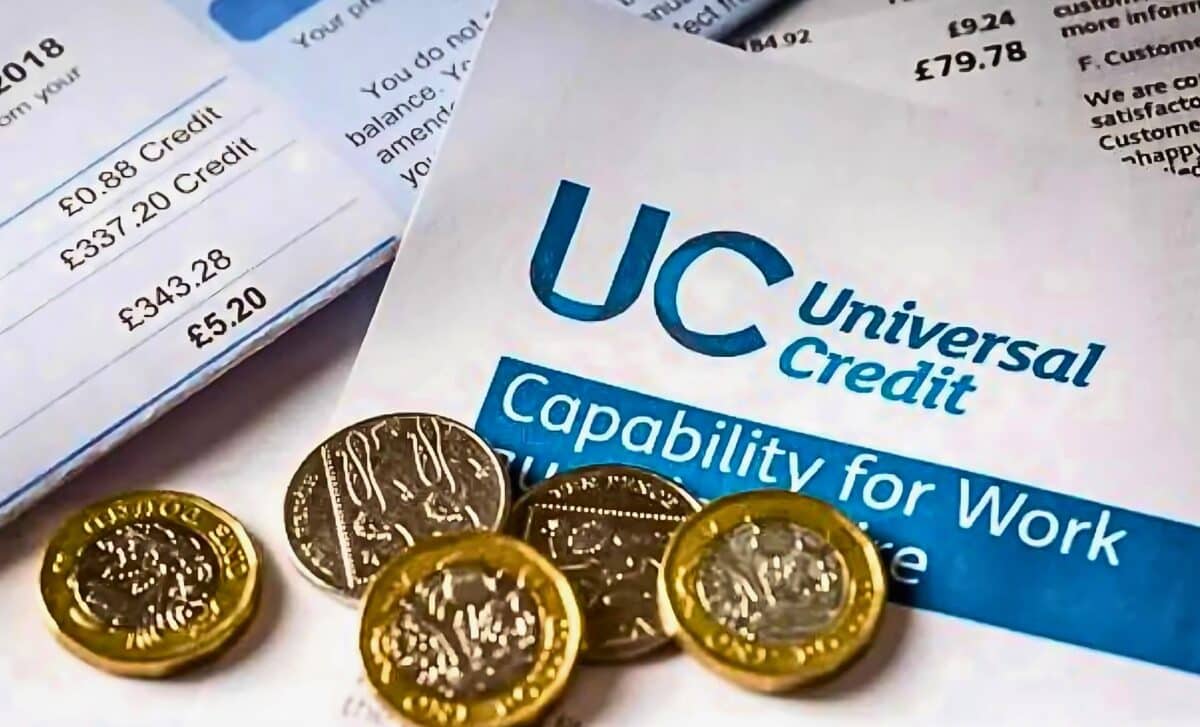In a landmark decision, the Department for Work and Pensions (DWP) has confirmed a significant shift in how Universal Credit repayments will be handled, which is set to benefit over 1.2 million households. From April 2024, the maximum repayment cap will be reduced from 25% to 15%, allowing claimants to keep more of their benefit award. This change, part of a broader government initiative to provide more financial support to vulnerable individuals and families, means that claimants will retain an additional £420 annually, a crucial amount for those facing ongoing financial difficulties.
The DWP’s announcement comes at a time when millions of households are struggling with the rising cost of living, inflation, and other financial pressures. By lowering the repayment cap, the government aims to give claimants greater flexibility in managing their finances and focusing on their most pressing needs, such as paying for essential utilities, food, and other household expenses.
A More Fair Repayment System
The move to reduce the repayment cap is part of the DWP‘s effort to introduce a more balanced and fair repayment system, which prioritizes the most urgent financial obligations for Universal Credit claimants. In response to a written question in Parliament, work and pensions minister, Alison McGovern, explained, “We are introducing a Fair Repayment Rate for deductions made from a Universal Credit award, allowing customers to prioritise their most severe third-party debts and retain more of their benefit award to budget for essentials.” This statement underlines the government’s aim to provide a system that not only helps people manage their day-to-day expenses but also ensures they can meet their other financial responsibilities without the added strain of excessive deductions.
The DWP has long faced criticism for the level of deductions taken from Universal Credit awards, which were sometimes as high as 25% for claimants who had existing debts. By reducing this cap, the government is taking steps toward a more compassionate and equitable approach, which better aligns with the needs of those on low incomes. The reduction means that the average claimant will retain an additional £420 per year, a significant sum for many struggling to make ends meet. McGovern noted that this move will benefit around 1.2 million households, offering them a much-needed financial cushion.
The Importance of Carer’s Support
As part of the changes to Universal Credit, there will also be additional financial support for those who provide care for loved ones. For years, carers have had to balance their caregiving responsibilities with financial pressures, but the DWP’s latest adjustments are set to ease some of that burden. Work and pensions minister, Sir Stephen Timms, explained, “These benefits can be paid to carers at a higher rate than those without caring responsibilities through the carer element and the additional amount for carers respectively.”
This is crucial, as many carers are often forced to sacrifice their own earnings or work part-time to fulfill their caregiving roles. The introduction of higher support for those who care for others will help ensure that they are not left financially vulnerable, given the heavy demands placed on them. By providing additional financial assistance through the carer element of Universal Credit, the government recognizes the unique challenges that carers face and the value of their work. In many cases, carers may find themselves unable to work full-time or even part-time, meaning that Universal Credit is their primary source of income. With the new changes, they will receive the financial support they need to cover essential living costs while continuing to care for loved ones.
Benefit Increase and Other Support Measures
Alongside the reduction in the repayment cap, Universal Credit claimants will see a 1.7% increase in their benefit payments starting in April 2024. This increase is part of the government’s broader initiative to adjust benefit payments in response to inflation and the rising cost of living. The new standard monthly allowance rates will be as follows:
- Single under 25: £316.98
- Single 25 and over: £400.14
- Couple joint claimants both under 25: £497.55
- Couple joint claimants both 25 and over: £628.10
These increases are designed to help claimants keep pace with inflation and rising costs of essential goods and services. The increase will provide an important financial cushion for many households across the UK, particularly those facing high inflation rates and increasing prices for necessities such as food, housing, and energy.
In addition to the standard benefit increase, those claiming Carer’s Allowance or other additional benefits will be able to access further financial support. Claimants who provide care for someone with a health or disability-related benefit could receive up to £2,400 more per year through their Universal Credit or Pension Credit claims. This additional support is particularly significant for those who have caregiving responsibilities, often at the expense of their own income and working hours.










Giving them more money that’s why they don’t want a job they would loss money
Not everyone benefits is able to work Peter, I’ve been signed off permanently due to my disability. So not all can work. It’s a biased comment that all can work and don’t want to. Seriously think before commenting
Nonsense, I’m still losing £108 out of my £379 every month
It keeps saying 2024/April. Been there, didn’t see it, keep forking out money back to the DWP/HMRC/Child Maintenance. Fed up, broke. In fact more broke since signing onto UC 4months ago during to ill health and quitting my job than I’ve ever been in my life. They give with one hand(8 week wait for 1st payment), then say, ” we are taking legal action against you unless you pay £00000000’s back now. The systems fckd
Happy to give figures…..it’s so so wrong.
The government has all of my figures. I’ve worked all of my life. Paid my tax & NIE. Now, after being signed off work by my GP, I have never ever been so poor & after waiting months for a miniscule payment, it seems the DWP/HMRC/CM….want it all back & legal action & threat of prison. Go figure.
I fully agree with giving the right families that extra financial support,but it’s very important that it goes to the right families who need that support just giving it out to all Will then take away the positive help for the worst off families
I have just made a conplaint to UC about deductions. Apparently an ober payment of 158 pounds from when no one sees to know,which benefit ,no one
can tell me but didn’t stop them from deducting just under 100 pounds leaving me with 108 for a month along with my carers allowance. This department is not fit to run a lucky bag stall.
Yep 30 years on the tools! Working in government buildings putting there life saving fire and security alarms in cctv and bomb proof film amongst other establishments Full electrical apprenticeship from when I left school to be homeless for the second time at the age of 48 with c.o.p.d. can no longer work as struggle to keep up with the younger generation who have to throw it in together deadlines for jobs never been able to obtain my own home despite having a substantial deposit and mortgage in principle at one point! Due to having to support myself the last few Years because I didn’t qualify for benefits and didn’t want to apply unnecessarily thousands has gone into the hands of the government now leaving me penniless, homeless and mentally scarred as I’m offered shared accommodation a room with shared kitchen and bathroom facilities that are dire! But the government are quite happy to give the landlord £1000 a month for me stopping here ALONG WITH THE OTHER THREE TENANTS when the empty rooms are filled with people that are probably now and have been living on the street for sometime with no help as certain people are acquiring numerous houses of which the British citizen is being forced out of being able to acquire to get there money back by being able to charge £4000-£5000 pound a month depending on how many rooms the dwelling might have instead they expect the people that have paid into the government all there lives and handed all there money over for them to build more ridiculously unneeded and ridiculously priced dwellings that no British citizen can afford because the government has already had everybody’s money and yet were expected to pay again IT WOILD BE NICE TO KNOW WHAT WITH! “BRASS BUTTONS” FIGHT FOR FREEDOM?! THEY WOULD BE TURNING IN THEIR GRAVES AND I WOULDN’T BLAME THEM! WHAT A WASTE OF SO MANY LIVES!!!….
Well i can’t see this goverment getting in agane and the PM talks about the next ten year plan. They will be lucky to last 4 years. Why didnt he tell every one what his plan was he knew no one would vote to his party.
Ok so a lot of people who are on universal credit do need help and i understand that, but a lot more people on universal credit are there for the ride and have no intention of getting a job and never will Whilst getting more and more money to buy another packet of fags, or pint done the pub ,and all the government does is take money from pensioners who have worked all their lives, and also find ways of taking it from hard working people to fund a majority of universal credit recipients who are total drain on this country and hard working people and people who have worked all their lives and should be enjoying retirement. and the genuine people on universal credit by giving them a bad name as spongers when they really do need the help.
Ive been signed off work for 3 years now I worked full time but by the time I paid everything out CSA was £500 a month rent gas electric water TV I was only left with £20 a month for food cloths etc I was minimum wage to.now I’ve been signed off work for 5 years I get just under 2k a month in pip and universal credits and only pay £36 a month CSA after paying all my bills I’m left with £350 a week and have a free brand new mobility vehicle so why go to work don’t people ure be worse off
People who sit on backsides and do nothing get it all. My daughter works and gets it as she has a child but barely scrapes through it’s disgusting
I don’t that’s fair really should put up universal credit not medling with other benefits
What a pointless article. Why bother write about something you’re saying was 8 months ago? 🙈
Don’t get too excited. I doubt this is true. I really hope it is though.
Wow some people on here clearly don’t understand poverty for some families. I for one have sacrificed majority of my life for my son’s whom all have severe autism & challenging behaviour, so for all these people going on about people on benefits sat on there backsides doing nothing drags all us who are caring around the clock, yes around the clock because behaviours can occur at any time of day. Believe me when I tell you my life would have been easier for me to work, but I was put in a position of having to care for my son’s.
So carers who currently have their carars allowance deducted from their UC will not have it deducted making a small financial benefit for being a carer – I hope that’s right but it seems to good to be true, have I understood the article correctly? It would make a difference of about £75 a week i have read it right – doesn’t affect me personally but affects people close to me
Everyone seems to think people on benefit receive a lot of money to stay home. Please explain how someone can survive with £300 a month and pay for food, gas, electricity, water
This article is put simply very misleading and untrue. In our household I have secondary progessive multiple sclerosis Rheumatoid Arthritis and Osteoarthritis my husband Parkinsons and Osteoarthritis. HWP worked hard all his life (59) diagnosed 2020 PD is self employed agricultural based now my carer and no longer gainfully self employed as told bt DWP when transitioned to UC from WTC . DWP give in one and and take away with the other!! To date never actually received a penny into our account for his carers element and for the past 2 months we’ve received £0 by the time DWP have finished with their deductions. We have more than normal outgoings for attending numerous hospital and GP appointments not to mention day to day household running costs. Sick to the back teeth fighting diseases and the DWP is THE most horrendous life (if you can call it that) stress compounds symptoms. Can’t see DWP in practice actually benefitting us ever absolutely disgusting treated with total disregard apparently it’s quite alright for them to cease communication REALLY what a s**t Show DWP AREN’T fit for purpose. At the end of my tether feeling like there’s no where to turn. DWP algorithm for UC is weighted for the claimant to fail and DWP to meet their goal of not paying any benefit. The Government has blood on their hands let’s target the most vulnerable in Society whilst they all live in cuckoo land get severely subsided lives #noideahowthisisendingbutitsnogoingtobegood 😢😡😢
It’s not why people don’t want to work, I’ve worked forever and had kids and have to claim UC coz wages are poor, I’m a skilled worker and for years I always received same amount every month, we only just managed, since October our UC loss is £160 per week under Labour. I’m paying for Hotels and so are we all
I hate people who say get a job,I was a full time worker for years and I only gave up after being forced as I fled my ex husband and found out I have a number of illnesses which can’t be cured and I know I will get worse I’ve been told. Living on benefits is hard as so many people are quick to judge you why with 30 mg morphine in me every hour every day and I am still in agony no matter what position I am in. Think people need to be kind to each other instead always attacking without knowing the situation. If this true it will help but it’s still not the same as working full time so it’s hard. Personally I think if someone is permanently sick they should be paid the same amount as a full time worker and carers should be as there pay is shockingly low. Rant over hope one day it gets better. If they need to find the money cut MP and footballers wages to start with
Yes it would be nice if we all got help once a year I work and I don’t have any money left end of the month when I’ve paid bills and food
Until you’re in the position of not having enough money for the basic essentials, like food, utilities and household bills, you have to struggle every month.
This has an effect on your physical and mental health. If you’re fortunate to have a well paid job, with a pension waiting for you when you reach retirement age, then consider yourself fortunate in that regard! Some people are not going to be able to make ends meet!!
The government has never considered the poorer/elderly members of Society, in any way.
Not one government over the past decades, have ever been known to give people enough money to live comfortably on, without the stress of wondering how they are going to heat their homes, and to buy enough food to eat for a month. £10 bonuses for Christmas is an insult!!!